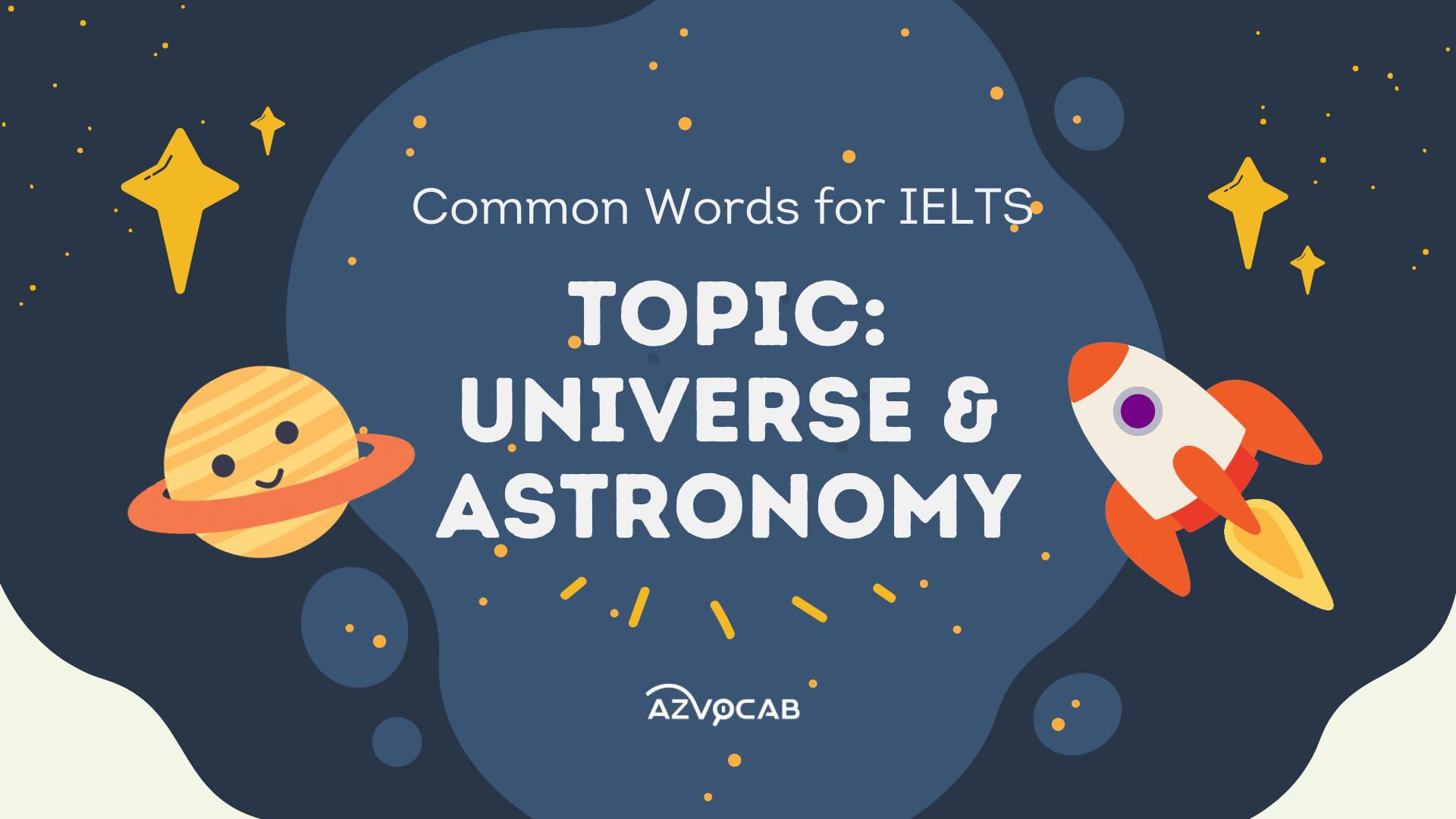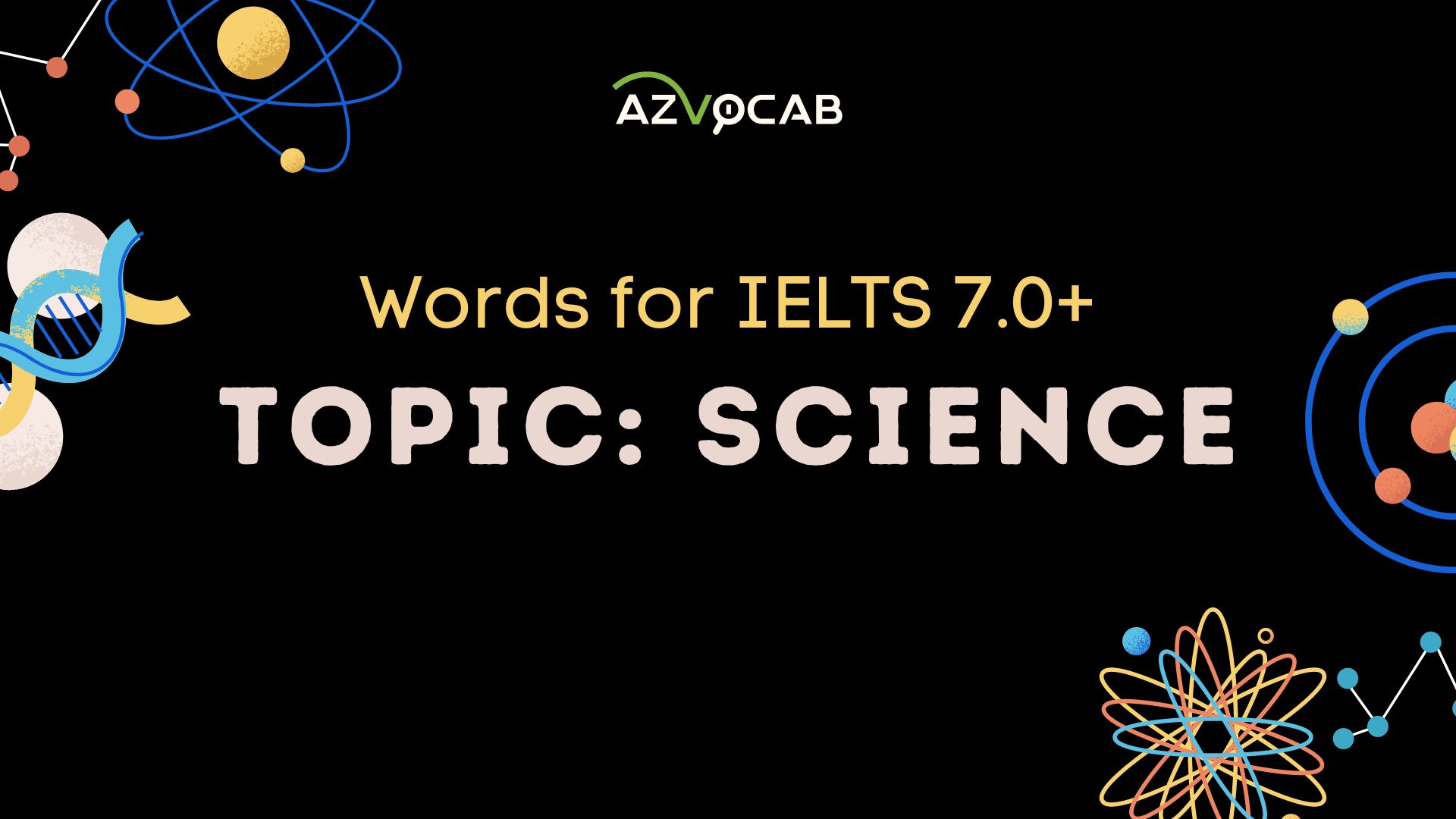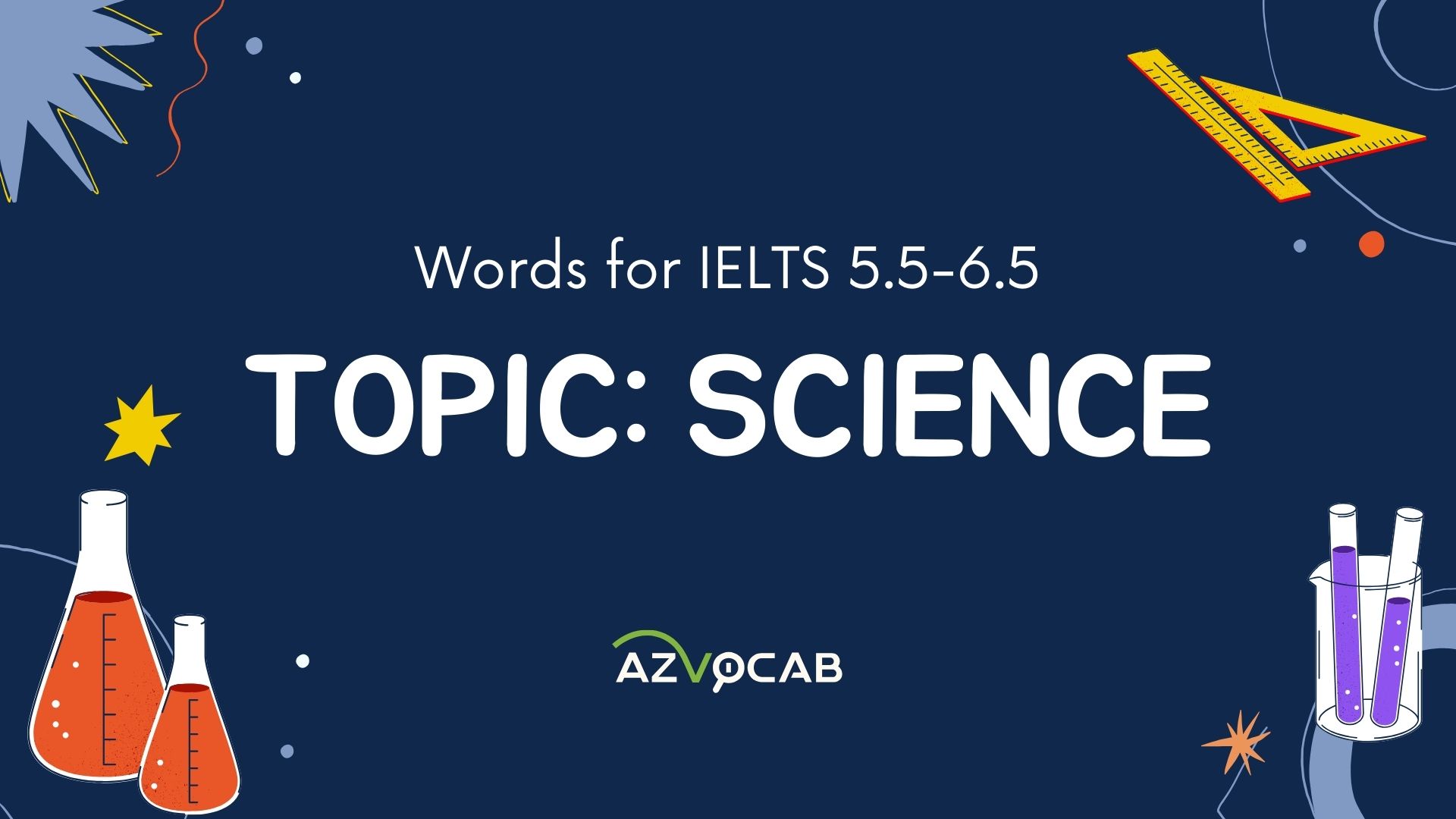50+ Common Words on the Topic of Universe and Astronomy for the IELTS exam
30 August, 2023Common words for IELTS

azVocab has compiled over 50 common words on the topic of “Universe and Astronomy” for the IELTS exam. These vocabulary words can be used in all four sections of four skills: Reading, Listening, Speaking, and Writing. azVocab has carefully selected examples that fit specific contexts in IELTS exams. This will help you understand how to use these words in context, increasing the effectiveness of your vocabulary learning.
1. Vocabulary about universe
| asteroid (n.) – one of many large rocks that circle the sun | The asteroids, meteoroids and apparently all comets originated in the explosion of planets (or moons). |
| atmosphere (n.) – the mixture of gases around the earth | CO2 plays a critical role in maintaining the balance in the Earth’s atmosphere and the air that we breathe. |
| cosmos (n.) – the universe considered as a system with an order and pattern | Scientists can now create computerized models of the cosmos. |
| crater (n.) – the round hole at the top of a volcano, or a hole in the ground similar to this | The surface of Venus also has many craters as a result of asteroid collisions. |
| debris (n.) – broken or torn pieces of something larger | Fortunately, the debris fell in mostly uninhabited areas and locals scrambled to collect a souvenir. |
| Earth (n.) – the planet third in order of distance from the sun, between Venus and Mars; the world on which we live | The Earth takes approximately 3651/4 days to go around the sun. |
| eclipse (n.) – an occasion when the sun disappears from view, either completely or partly, while the moon is moving between it and the earth, or when the moon becomes darker while the shadow of the earth moves over it | A lunar eclipse occurs when the moon is hidden by the sun. |
| galaxy (n.) – one of the independent groups of stars in the universe | The North Star is the brightest star in our galaxy. |
| meteor (n.) – a piece of rock or other matter from space that produces a bright light as it travels through the atmosphere | Many scientists believe that dinosaurs became extinct when a meteor hit the Earth. |
| moon (n.) – a similar round object that moves around another planet | We also know that Saturn has a large number of moons. |
| ocean (n.) – a very large area of sea | On 11 July 1979, the Skylab eventually crashed into the southern ocean off Esperance. |
| orbit (n.) – the curved path through which objects in space move around a planet or star | Its low orbit gradually pulled the 77-tonne Skylab down towards the Earth making a crash landing inevitable and causing a great deal of concern around the world. |
| outer space (n.) – the part of space that is very far away from Earth | In outer space, there are many high-energy particles, and the irradiation is very intensive. |
| planet (n.) – an extremely large, round mass of rock and metal, such as Earth, or of gas, such as Jupiter, that moves in a circular path around the sun or another star | Venus is unusual because it rotates in a different direction from the other planets orbiting the sun. |
| solar system (n.) – the sun and the group of planets that move around it | On Mercury the temperature varies more than on any other planet in the solar system and, as it has no water, it is unable to sustain life. |
| space (n.) – the empty area outside Earth’s atmosphere, where the planets and the stars are | Astronauts have been travelling in space for a long time now. |
| surface (n.) – the outer or top part or layer of something | The surface of the planet is covered in colossal volcanoes much larger than any on Earth. |
| universe (n.) – everything that exists, especially all physical matter, including all the stars, planets, galaxies, etc. in space | Many people wonder if there is intelligent life elsewhere in the universe. |
| horizon (n.) – the line at the farthest place that you can see, where the sky seems to touch the land or sea | The moon appears much bigger when it is close to the horizon. |
| cosmic (adj.) – relating to the universe and the natural processes that happen in it | Through transforming the universe, astro ethics can have cosmic consequences. |
| burst (v.) – to break open or apart suddenly, or to make something do this | A meteor air explosion is a type of air burst in which a meteor burst after entering a planetary body’s atmosphere. |
| collide (v.) – (especially of moving objects) to hit something violently | Scientists believe that dinosaurs became extinct when a meteor collided with Earth. |
2. Vocabulary about astronomy and space exploration
| astronaut (n.) – a person who has been trained for travelling in space | The station, called Skylab, managed to carry three different crews of astronauts over a nine-month period, in spite of the fact that it lost a meteor shield on launch. |
| astronomy (n.) – the scientific study of the universe and of objects that exist naturally in space, such as the moon, the sun, planets, and stars | They used a system of symbols that represented words and syllables to record information about the deeds of their rulers as well as information connected to their calendar and astronomy. |
| exploration (n.) – the activity of searching and finding out about something | There are some important things that space exploration can teach us, especially about the history of our own planet and its atmosphere. |
| explorer (n.) – someone who travels to places where no one has ever been in order to find out what is there | Our space explorer will be able to float around the cabin and view the Earth. |
| finding (n.) – a piece of information that is discovered during an official examination of a problem, situation, or object | Satellites have recently sent back important new data from Mars. although it is not yet clear what significance the findings have for future space exploration. |
| gas (n.) – a substance in a form like air that is neither solid nor liquid | Saturn has barely any solid surface, as its composition is mostly gas. |
| gravity (n.) – the force that attracts objects towards one another, especially the force that makes things fall to the ground | There the passengers will be able to experience zero gravity in a special simulator. |
| light year (n.) – the distance that light travels in one year (about 9.5 million million kilometres) | Astronomers suggest that orbiting around Sagittarius A*, 26,000 light years from Earth, maybe as many as tens of thousands of smaller black holes. |
| radiation (n.) – a form of energy that comes from a nuclear reaction and that can be very dangerous to health | I don’t think there will ever be a way to shield us totally from cosmic radiation. |
| rocket (n.) – large cylinder-shaped object that moves very fast by forcing out burning gases, used for space travel or as a weapon | During the flight itself, a rocket will propel the spacecraft into suborbital space in excess of 100,000m above the Earth’s atmosphere. |
| satellite (n.) – a device sent up into space to travel around the earth, used for collecting information or communicating by radio, television, etc | There are currently approximately 8,000 pieces of space junk floating above our heads thanks to the satellites, space shuttles and space stations out there. |
| simulator (n.) – a piece of equipment that is designed to represent real conditions, for example in an aircraft or spacecraft | People learning to fly often practice on a flight simulator. |
| space shuttle (n.) – a vehicle in which people travel into space and back again, sometimes carrying a satellite or other equipment into orbit (= a curved path through space) | We know a lot more about Saturn nowadays, thanks to the Voyager space shuttle, which taught us a lot about the rings around Saturn. |
| space station (n.) – a vehicle in which people can travel round the earth, outside its atmosphere, doing scientific tests | Although there is an international space station, this is currently only involved in research. |
| spacecraft (n.) – a vehicle used for travel in space | Spacecrafts need to reach extremely high speeds in order to escape the gravitational pull of the Earth. |
| weightlessness (n.) – the state of having or appearing to have no weight; the fact of not being affected by gravity (= the force that makes things fall to the ground) | Weightlessness can be a health problem for people working for long periods in space. |
| astronomical (adj.) – connected with astronomy | The results predicted astronomical observations exactly and provided the first proof of his theory. |
| climatic (adj.) – relating to general weather conditions | Rotational instabilities would have caused dramatic changes in Earth’s climatic zones over time. |
| colossal (adj.) – extremely large | The colossal rocket, however, may still need to roll back to Kennedy Space Center’s Vehicle Assembly Building. |
| commercial (adj.) – related to making money by buying and selling things | If you have ever dreamed of traveling in space then our commercial space travel program will make that dream a reality. |
| gravitational (adj.) – relating to gravity or gravitation (= the force that attracts objects towards one another) | Careful measurements have allowed us to develop a thorough understanding of minute gravitational changes and given us the ability to accurately determine the past and future positions of the planets. |
| lunar (adj.) – of or relating to the moon | During this lunar cycle, many different phases of the moon are visible from Earth, even though the moon itself never changes shape. |
| meteoric (adj.) – relating to or caused by a meteor | The sudden flash of light in the night sky was caused by a meteoric fireball. |
| repetitive (adj.) – involving doing or saying the same thing several times, especially in a way that is boring | Though we see a slightly different moon from Earth each day, its repetitive cycle is both predictable and functional. |
| uninhabitable (adj.) – not habitable (= suitable to live in) | Perhaps we wouldn’t need to worry about the Earth being uninhabitable in a hundred years’ time. |
| unmanned (adj.) – used to refer to a spacecraft, or a place where military guards work, that has no people present to operate or be in charge of it | In February 1974, the final crew returned to Earth, and, for the next five and a half years, the Skylab continued to orbit the Earth, unmanned and unused. |
| vast (adj.) – extremely big | With the increasing use of satellites to monitor activities here on Earth, as well as the very real prospect of space tourism, now is a good time to ask who owns or, more importantly, governs the vast area of space above us? |
| acclimatise (v.) – to change to suit different conditions of life, weather, etc., or to make someone or something do this | There the passengers will be able to experience zero gravity in a special stimulator, this will allow the passengers to acclimatise. |
| explore (v.) – to search a place and discover things about it | Most of our planet has already been mapped and explored, so it is not surprising that explorers turn their attention to other parts of the universe. |
| launch (v.) – to send something out, such as a new ship into the water or a spacecraft into space | In May 1973, the USA launched its first manned space station. |
| orbit (v.) – to follow a curved path around a planet or star | On this mission, the Shuttle will orbit the Earth at a height of several hundred miles. |
| propel into/to/towards (v.) – to cause someone to do an activity or be in a situation | One of the most powerful rockets ever built, Nasa’s Saturn V rocket, propelled Apollo astronauts towards the moon. |
| rotate (v.) – to turn or cause something to turn in a circle, especially around a fixed point | Venus is unusual because it rotates in the opposite direction to other planets. |
| simulate (v.) – to do or make something that looks real but is not real | This computer program simulates extremes of weather so that pilots can experience difficult flying conditions. |
| sustain (v.) – to cause or allow something to continue for a period of time | Mercury’s temperature varies more than on any other planet in the solar system and, as it has no water, it is unable to sustain life. |
| undergo (v.) – to experience something that is unpleasant or something that involves a change | However, unlike the months of training that astronauts undergo, our passengers will be ready for launch within two days. |
Here is common vocabulary on the topic of Universe and Astronomy for the IELTS exam. We hope it will help you tackle this topic more easily. Check out more common vocabulary topics for IELTS in other articles on azVocab!
ielts
ielts vocabulary
3711
Share





